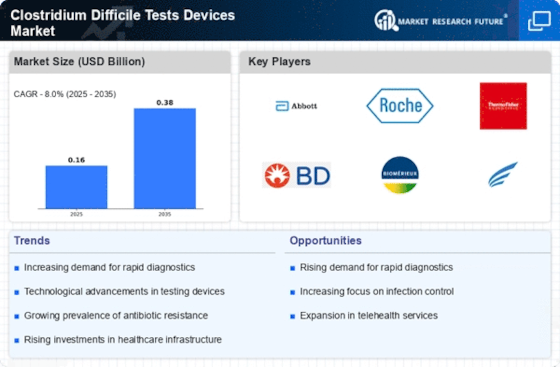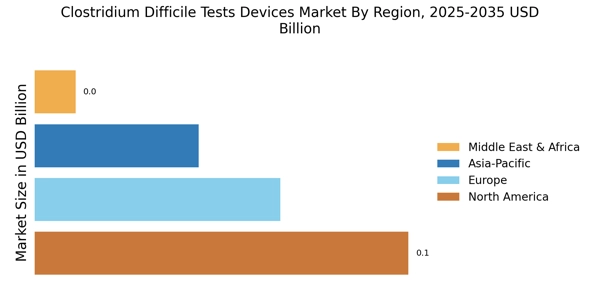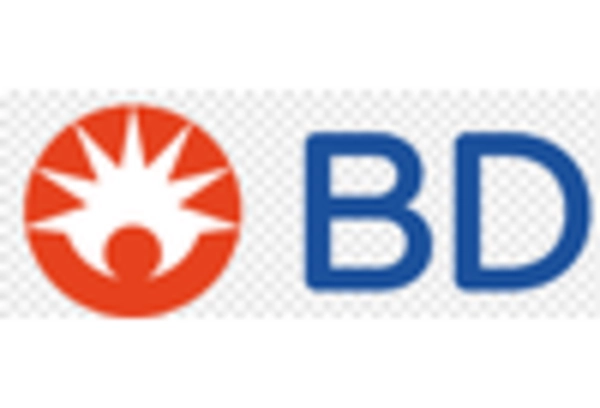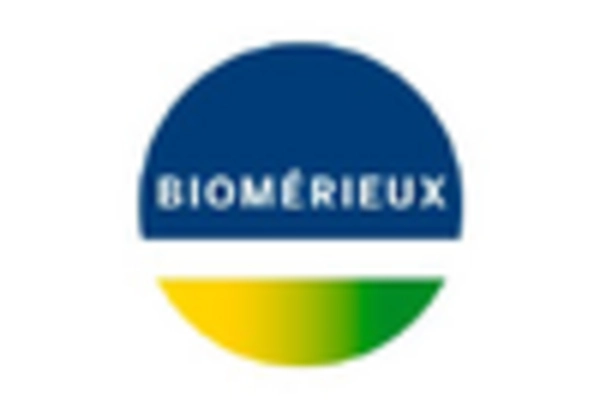Rising Healthcare Expenditure
Rising healthcare expenditure is another key driver influencing the Clostridium Difficile Tests Devices Market. As healthcare budgets increase, hospitals and clinics are allocating more resources towards advanced diagnostic technologies. This trend is particularly evident in regions where healthcare systems are undergoing modernization and expansion. Increased funding allows for the procurement of state-of-the-art testing devices, which can enhance diagnostic accuracy and improve patient management. Additionally, as healthcare providers recognize the economic burden associated with CDI, investing in effective testing solutions becomes a priority. The correlation between higher healthcare spending and the adoption of innovative diagnostic devices suggests a positive outlook for the market. As healthcare expenditures continue to rise, the demand for Clostridium Difficile testing devices is likely to grow.
Regulatory Support and Guidelines
Regulatory support plays a crucial role in shaping the Clostridium Difficile Tests Devices Market. Government agencies are increasingly establishing guidelines and frameworks to ensure the safety and efficacy of diagnostic devices. This regulatory environment encourages manufacturers to innovate and improve their products, fostering competition within the market. Additionally, the approval of new testing devices by regulatory bodies can lead to increased adoption in healthcare settings. As regulations evolve, they often reflect the latest scientific findings and technological advancements, which can further stimulate market growth. The alignment of regulatory standards with clinical needs ensures that healthcare providers have access to reliable and effective testing solutions, thereby enhancing the overall quality of care for patients suffering from CDI.
Growing Focus on Infection Control Measures
The growing emphasis on infection control measures in healthcare settings is a significant driver for the Clostridium Difficile Tests Devices Market. Hospitals and clinics are increasingly implementing stringent protocols to prevent the spread of infections, particularly in light of rising CDI cases. This focus on infection control has led to a greater demand for rapid and accurate diagnostic testing to identify CDI cases promptly. Healthcare facilities are investing in advanced testing devices as part of their infection prevention strategies, which is likely to drive market growth. Furthermore, educational initiatives aimed at healthcare professionals regarding the importance of early detection and treatment of CDI are contributing to the increased utilization of testing devices. As infection control remains a priority, the market for Clostridium Difficile testing solutions is expected to expand.
Technological Innovations in Diagnostic Devices
Technological advancements in diagnostic devices are significantly influencing the Clostridium Difficile Tests Devices Market. Innovations such as molecular testing, rapid antigen detection, and next-generation sequencing are enhancing the accuracy and speed of CDI diagnosis. These technologies allow for quicker turnaround times, which is crucial in clinical settings where timely treatment can drastically improve patient outcomes. The integration of automation and artificial intelligence in testing processes is also streamlining workflows in laboratories, thereby increasing efficiency. As healthcare providers seek to adopt cutting-edge solutions to combat CDI, the market for these advanced testing devices is expected to expand. The ongoing research and development efforts in this field suggest a promising future for the industry, as new technologies continue to emerge.
Increasing Incidence of Clostridium Difficile Infections
The rising incidence of Clostridium Difficile infections (CDI) is a primary driver for the Clostridium Difficile Tests Devices Market. Recent data indicates that CDI cases have surged, particularly among older adults and those with weakened immune systems. This increase in infections necessitates the development and deployment of effective diagnostic devices. Healthcare facilities are increasingly prioritizing rapid and accurate testing to manage CDI outbreaks, which has led to a heightened demand for advanced testing devices. The market is projected to grow as hospitals and clinics invest in innovative technologies to enhance patient outcomes and reduce the spread of infections. As awareness of CDI's impact on public health grows, the need for reliable testing solutions becomes more pressing, further propelling the market forward.


















